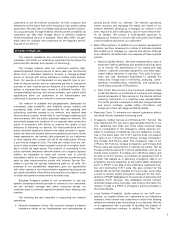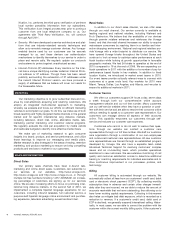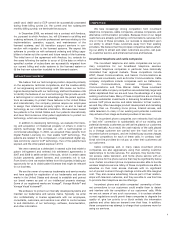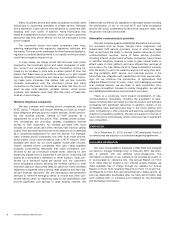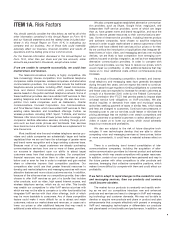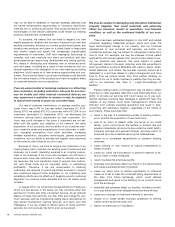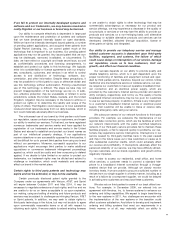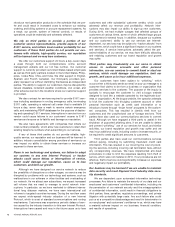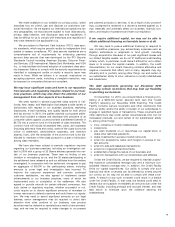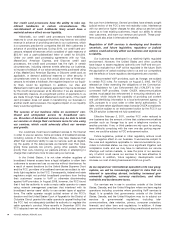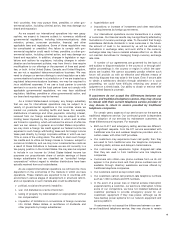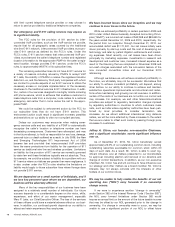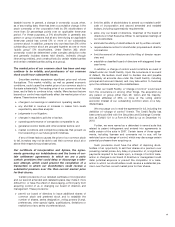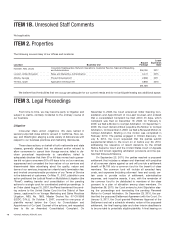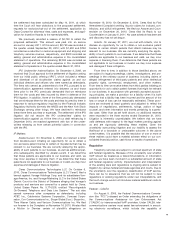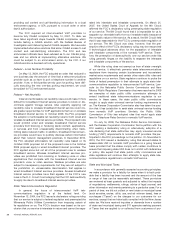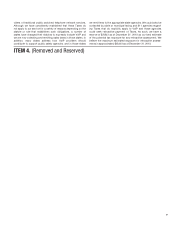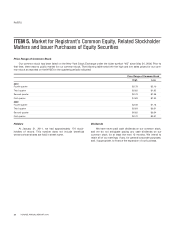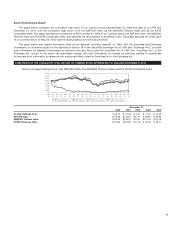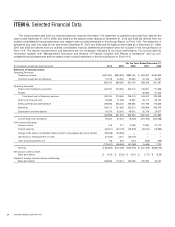Vonage 2010 Annual Report Download - page 21
Download and view the complete annual report
Please find page 21 of the 2010 Vonage annual report below. You can navigate through the pages in the report by either clicking on the pages listed below, or by using the keyword search tool below to find specific information within the annual report.O
ur credit card processors have the ability to take sig
-
nifi
ca
nt h
o
l
dbac
k
s
in
ce
rt
a
in
c
ir
cu
m
s
t
a
n
ces
.Th
e
reinstatement o
f
such holdbacks likely would have
a
material adverse e
ff
ect on our li
q
uidit
y
.
Hi
stor
i
ca
lly
, our cre
di
t car
d
processors
h
ave esta
bli
s
h
e
d
r
eserves to cover an
y
exposure t
h
at t
h
e
y
ma
yh
ave as we co
ll
ec
t
r
evenue in advance of providing services to our customers, whic
h
i
s a customar
y
practice for companies that bill their customers in
advance of providing services. During 2010, our credit card pro
-
cessors released all reserves which consisted of cash reserves o
f
$
23
,
101 and a cash-collateralized letter of credit for
$
10
,
500.
U
n
d
er our cre
di
t car
d
process
i
ng agreements w
i
t
h
our
Vi
sa
,
M
aster
C
ard, American Express, and Discover credit car
d
p
rocessors, t
h
e cre
di
t car
d
processor
h
as t
h
er
i
g
h
t,
i
n certa
i
n
circumstances, including adverse events affecting our business
,
t
o impose a holdback of our advanced payments purchased using
a Visa, Master
C
ard, American Express, or Discover credit card, as
applicable, or demand additional reserves or other securit
y
.I
f
circumstances were to occur that would allow an
y
of these pro
-
cessors to re
i
nstate a
h
o
ldb
ac
k
,t
h
e negat
i
ve
i
mpact on our
li
qu
id
-
i
ty likely would be significant. In addition, our Visa and
M
aster
C
ard credit card processin
g
a
g
reement may be terminate
d
by
the credit card processor at its discretion if we are deemed t
o
b
e financially insecure. As a si
g
nificant portion of payments to u
s
are made throu
g
h Visa and Master
C
ard credit cards, if the credi
t
card processor does not assist in transitionin
g
our business t
o
another credit card processor, the ne
g
ative impact on our liquidity
l
ikely would be si
g
ni
f
icant
.
The success o
f
our business relies on customers’ con-
t
i
nue
d
an
d
un
i
mpe
d
e
d
access to
b
roa
db
an
d
serv-
ice. Providers of broadband services ma
y
be able to bloc
k
our services or charge their customers more
f
or also usin
g
our services, which could adversel
y
affect our revenue
an
d
growt
h
.
O
ur customers must have broadband access to the Interne
t
i
n order to use our service. Some
p
roviders of broadband access,
i
ncludin
g
outside of the United States, may take measures that
a
ff
ect their customers’ ability to use our service, such as de
g
rad-
i
n
g
the quality o
f
the data packets we transmit over their lines,
g
ivin
g
those packets low priority,
g
ivin
g
other packets hi
g
her
p
riority than ours, blockin
g
our packets entirely or attemptin
g
to
char
g
e their customers more
f
or also usin
g
our services
.
In the United States, it is not clear whether su
pp
liers o
f
b
roadband Internet access have a le
g
al obli
g
ation to allow thei
r
cus
t
o
m
e
r
s
t
o access a
n
d use ou
r
se
rvi
ce
with
ou
t int
e
r
fe
r
e
n
ce
.A
s
a result of recent decisions by the United States Supreme Cour
t
and the FCC,
p
roviders of broadband services are sub
j
ect to rela-
t
ively li
g
ht re
g
ulation by the FCC. Consequently, federal and stat
e
r
e
g
ulators mi
g
ht not prohibit broadband providers
f
rom limitin
g
t
heir customers’ access to VoIP or otherwise discriminatin
g
a
g
ainst VoIP providers. In Au
g
ust 2008, however, the FCC foun
d
th
at
i
t
h
a
d
t
h
e aut
h
or
i
ty to or
d
er a ma
j
or ca
bl
e operator to ceas
e
usin
g
network mana
g
ement practices that inter
f
ered with it
s
b
roadband service users’ abilit
y
to use certain t
y
pes o
f
applica
-
t
ions. The cable operator sou
g
ht judicial review of the FCC’
s
decision and the United States Court of Appeals for the District o
f
C
olumbia Circuit granted the cable operator’s appeal finding tha
t
t
he FCC had not adequately justified its authority to regulate th
e
ca
bl
e operator
’
s con
d
uct.
M
ore recent
ly i
n
D
ecem
b
er 2010, t
h
e
FCC adopted new net neutralit
y
rules that would protect services
l
ike ours from interference. Several providers have already sou
g
h
t
judicial review of the FCC’s new net neutrality rules. Interferenc
e
with our service or hi
g
her char
g
es
f
or also usin
g
our service coul
d
cause us to lose existin
g
customers, impair our ability to attrac
t
new customers, and harm our revenue and
g
rowth. These prob
-
le
m
s cou
l
da
l
so a
ri
se
in int
e
rn
a
ti
o
n
a
lm
a
rk
e
t
s.
Re
g
ulation of VoIP services is developin
g
and therefor
e
u
ncertain, and
f
uture legislative, regulatory or judicial
actions could adversely a
ff
ect our business and expose us
to liabilit
y.
O
ur business has developed in a relatively li
g
htly re
g
ulated
environment. However, the United States and other countrie
s
have be
g
un to assert re
g
ulatory authority over VoIP and are con
-
t
inuin
g
to evaluate how VoIP will be re
g
ulated in the
f
uture. Both
t
he application o
f
certain existin
g
rules to us and our competitors
and the e
ff
ects o
ff
uture re
g
ulatory developments are uncertain
.
I
nterconnecte
dV
o
IP
prov
id
ers, suc
h
as
V
ona
g
e, are su
bj
ec
t
t
o certain FCC rules. For example, on August 5, 2005, the FC
C
r
eleased an Order extending the obligations of the Communica
-
t
ions Assistance for Law Enforcement Act (“CALEA”) to inter-
connected VoIP providers. Under CALEA, telecommunication
s
carriers must assist law en
f
orcement in executing electronic sur
-
v
eillance, which include the capability o
f
providing call content
and call-identi
f
ying in
f
ormation to a local en
f
orcement agency, o
r
LEA, pursuant to a court order or other lawful authorization. To
date, we have taken significant steps towards
C
ALEA compliance.
We could be subject to an enforcement action b
y
the F
CC
if our
C
ALEA solution is deemed not full
y
operational.
Effective Februar
y
2, 2011, another F
CC
order reduced t
o
one business da
y
the amount of time that a telecommunications
p
rov
id
er suc
h
as
V
onage
h
as to port a te
l
ep
h
one num
b
er t
o
another provider. If we, or third parties we rely upon for porting
,
have difficulty complying with the new one-day porting require-
ment, we could be subject to F
CC
enforcement action
.
Future le
g
islative, judicial or other re
g
ulatory actions coul
d
have a ne
g
ative effect on our business. If we become subject t
o
t
he rules and re
g
ulations applicable to telecommunications pro
-
v
iders in individual states, we may incur si
g
nificant liti
g
ation and
compliance costs, and we may have to restructure our servic
e
offerin
g
s, exit certain markets, or raise the price of our services
,
any o
f
which could cause our services to be less attractive to
customers. In addition,
f
uture re
g
ulatory developments coul
d
i
ncrease our cost o
f
doin
g
business and limit our
g
rowth
.
A
s we expan
d
our
i
nternat
i
ona
l
operat
i
ons
i
nto new geog
-
raphies, we will be increasin
g
ly subject to risks that ar
e
i
n
h
erent
i
n operat
i
ng a
b
roa
d
,
i
nc
l
u
di
ng
i
ncrease
d
gov-
ernmental re
g
ulation, currency restrictions, and other
r
es
tr
a
int
sa
n
dbu
r
de
n
so
m
e
t
a
x
es.
O
ur services are in use in countries outside of the
U
nited
S
tates, Canada, and the United Kin
g
dom where we have re
g
ula
r
operations includin
g
countries where providin
g
VoIP services is
i
lle
g
al. It is possible that
g
overnments outside o
f
the United
S
tates, Canada, and the United Kin
g
dom may try to subject ou
r
s
ervices to
g
overnmental re
g
ulations, includin
g
tele
-
communications, data retention, privacy, consumer protection
,
f
inancial, and other laws and re
g
ulations. In addition, i
f
these
g
overnments believe that we are providin
g
unauthorized service i
n
14
VO
NA
G
E ANN
U
AL REP
O
RT 2010



